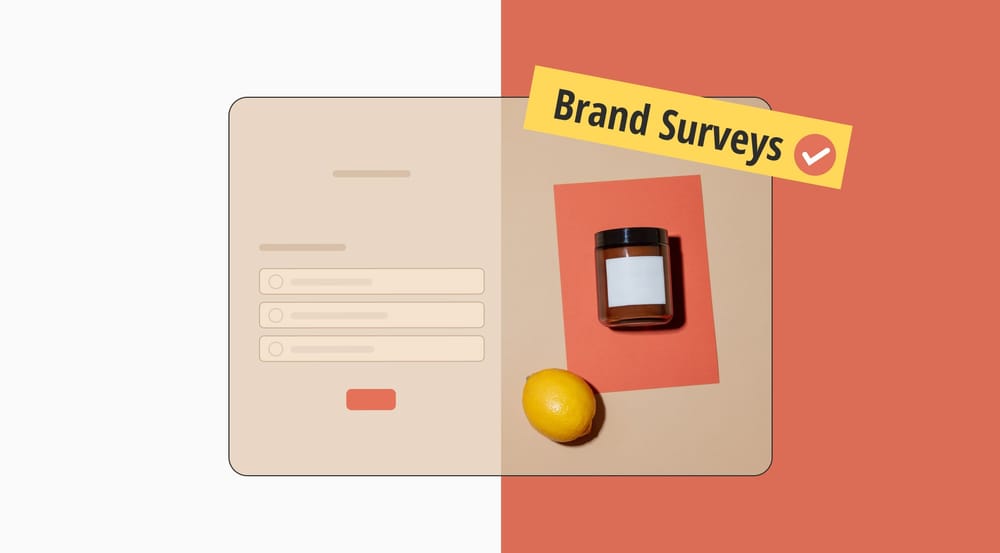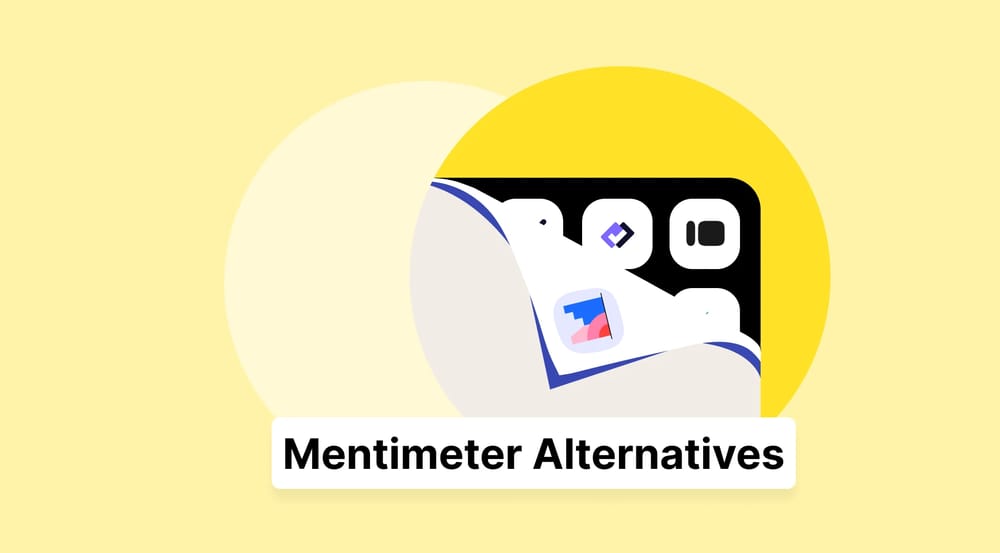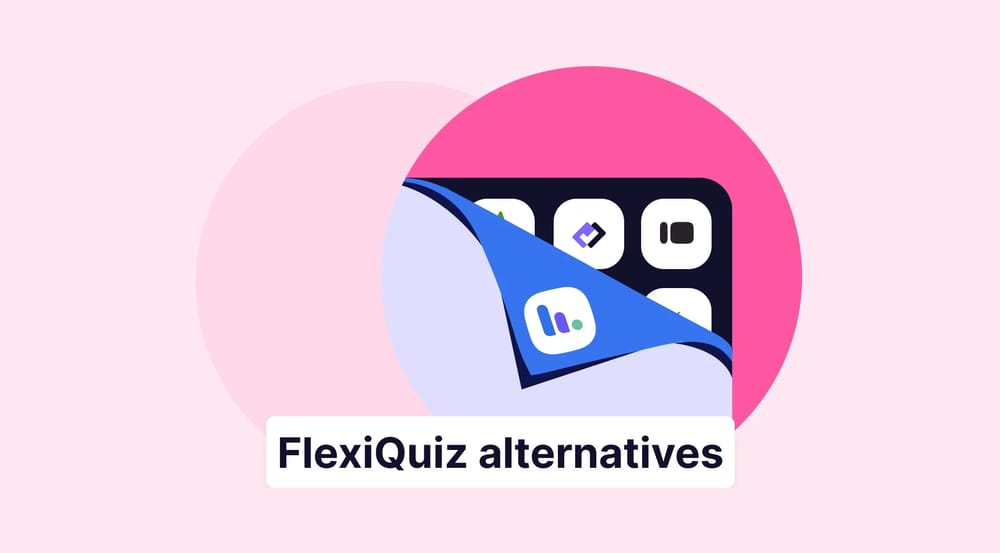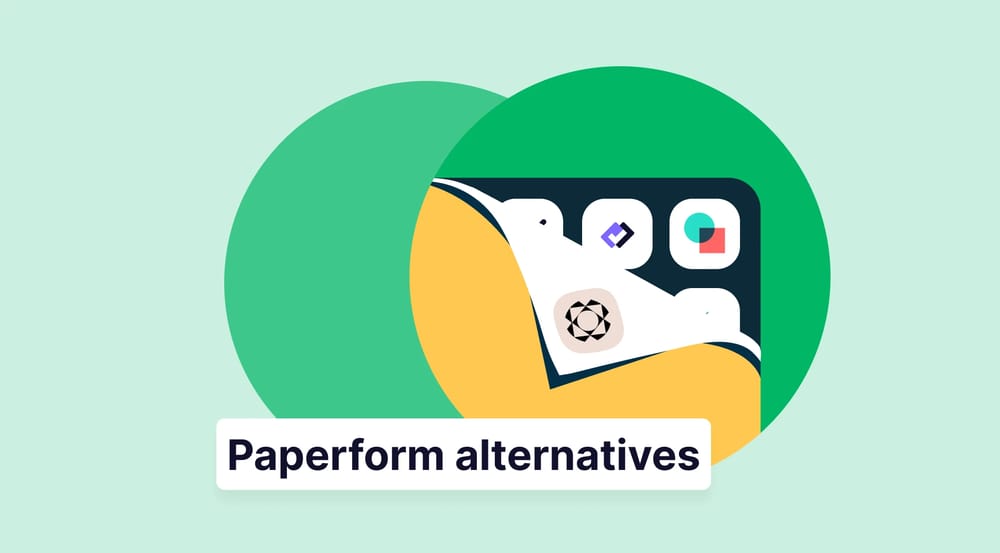Brand surveys are an effective tool that helps you collect valuable feedback that you can rely on when creating a marketing strategy that resonates with your target audience. They also help you identify areas to improve during product development and provide you with insights into how you can improve your brand positioning.
In this article, we’ll discuss branded surveys and their benefits. We’ll also discuss different types of online surveys and share links to templates you can use. And if you’re not sure what questions to include in your next brand survey, we’ve also included 15 types of questions to help you get started.
What are brand surveys?
Brand surveys are a research tool that companies use to collect data and feedback from customers and prospects on how they perceive different brand elements.
You can gain valuable insights into various brand elements by analyzing the feedback and data gathered from brand surveys. These elements include your:
- Customer satisfaction levels
- Overall brand sentiment
- Level of awareness
- Brand’s reputation
- Brand positioning
Companies have traditionally relied on different methods to run brand surveys, such as face-to-face interviews, paper questionnaires, telephone interviews, and focus groups.
Due to technological advancements and the widespread adoption of the internet, these survey options have significantly evolved.
As a result, security concerns have also evolved, and companies have had to respond. Data clean rooms can facilitate secure engagement between brands and survey participants without compromising sensitive personal information.
Survey responses can be enhanced, allowing deeper insights and enabling marketers to use other data sources (such as loyalty program data) to produce more accurate and useful findings.
Benefits of brand surveys
Brand surveys typically focus on helping you understand your customers’ perceptions, preferences, and attitudes toward a brand, product, or service. But that’s not all. Let’s break down the top benefits of brand surveys for any organization. Here’s why you don’t want to skip out on sending surveys to existing customers:
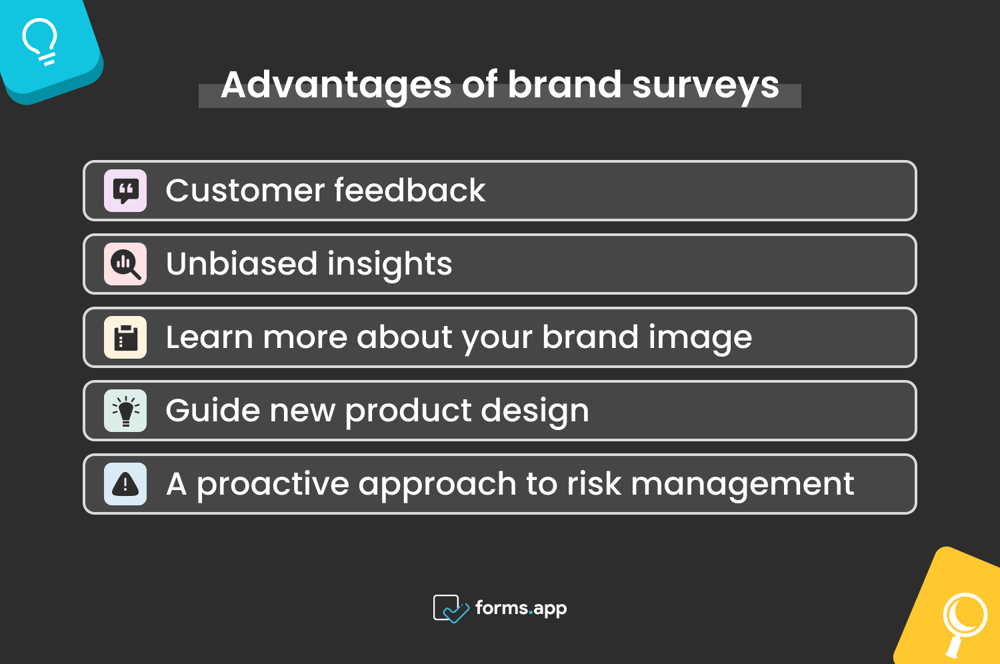
Pros of using brand surveys
Customer feedback
For example, if you’re a healthcare provider, a brand survey will help you gather patient feedback on their overall experience with your service.
The feedback you collect includes their views on how they interact with health staff, the quality of care they receive, and the efficiency of your processes. This information can help you identify areas for improvement and ensure a consistently positive patient experience.
Unbiased insights
Brand surveys provide valuable insights into your customers’ and potential customers’ unbiased opinions, thoughts, and feelings regarding your brand. This information helps you eliminate common cognitive biases that significantly influence strategic decisions.
For example, brand surveys counter confirmation bias by providing objective data from your customers and target audience rather than allowing your marketing team to prioritize information that merely confirms their preexisting beliefs about the brand.
They also reduce the impact of availability bias by ensuring marketers have a representative sample of customer perceptions rather than overly relying on the most easily recalled examples.
Learn more about your brand image
Surveys help assess how customers perceive your brand, shedding light on your strengths and weaknesses. They also reveal what attributes or emotions customers associate with your brand.
For instance, a limited liability company (LLC) operating in the eco-friendly product space might use brand surveys to gauge public perception of its commitment to sustainability.
These unbiased insights help them understand the effectiveness of their messaging and objectively adjust strategies accordingly.
This insight helps them understand the effectiveness of their messaging and adjust strategies accordingly. Such surveys can reveal if the brand resonates well with its target audience, guiding the LLC in refining its product offerings and marketing approaches.
Guide new product design
Brand surveys are the perfect opportunity to gather inside information on what products or features your customers want to see next. In other words, answers from a simple survey can g can guide the development of new products or services that better meet customer needs.
That’s not all. You can also use surveys to asses how current products are performing and what to double down on, and what might need some improvements.
A proactive approach to risk management
Early identification of potential problems through customer feedback can help mitigate risks. Surveys can guide responses during cruises by understanding customer concerns and sentiments. That way, you can take a proactive approach to putting out fires before they spread and cause reputational damage. It’s a simple yet effective approach.
Types of brand surveys
A big part of collecting high-quality feedback from your customers and prospects is choosing the right kind of brand survey, so each survey you run should serve a specific purpose. Here are five types of brand surveys that you can use for gathering customer information or feedback:
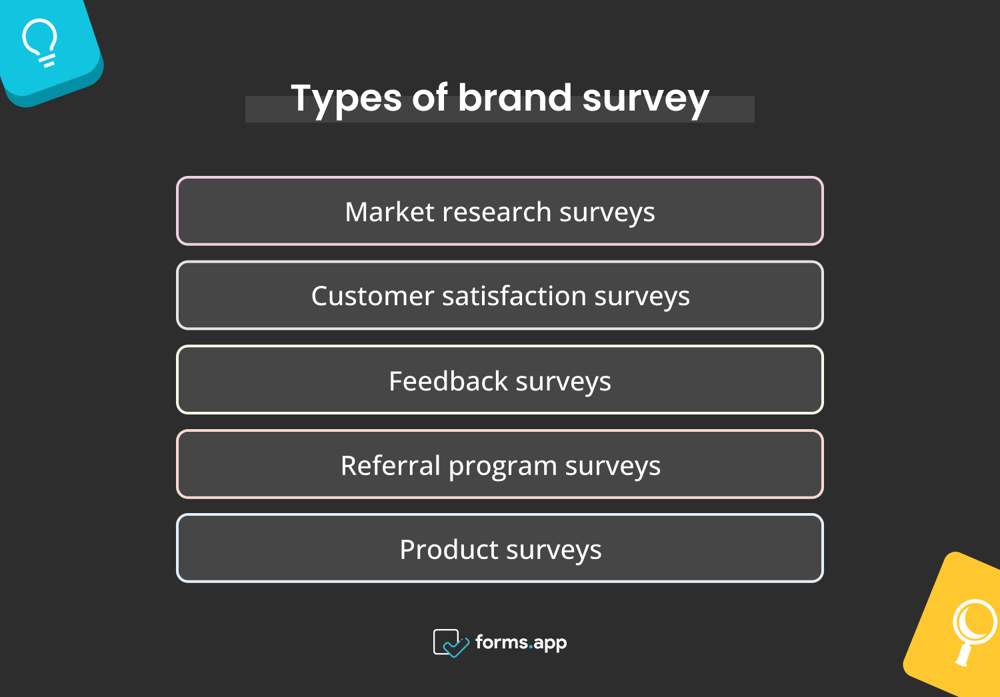
Brand survey types
Market research surveys
Market research surveys provide valuable insights into the level of brand awareness in your niche or industry, how your target audience perceives your brand, and your market positioning.
This tool provides a reliable way to compare yourself against your competitors instead of relying on guesswork and inaccurate data. You can make informed decisions to enhance your brand strategy with feedback and insights from market surveys.
You can use this template to create a market survey when launching a new product or service, rebranding, or want to better understand your target audience’s opinions to inform your marketing strategies more effectively.
Customer satisfaction surveys
Customer satisfaction survey questions that help you assess customer satisfaction with your brand’s products, services, and overall customer experience.
Send customer satisfaction surveys to existing customers to help you understand what is working well in your customer service and identify improvement areas.
The best time to run this survey is immediately after a customer buys from you or interacts with a customer support representative.
Alternatively, create and schedule a quarterly survey that you send to your customer base to determine whether they’re getting value for their money and what they think about their ongoing experience with your brand.
Feedback surveys
Feedback surveys help you collect open-ended feedback, opinions, and comments from customers about their interactions with a brand.
For example, if you just hosted an event, a post-event feedback survey will include questions that allow attendees to express their opinions and concerns about the event.
This feedback will help you know whether your events resonate with your target audience and guide you when planning future events to meet their expectations.
Referral program surveys
These surveys help you assess the effectiveness of your referral program and provide insights into how to generate more awareness and interest among current customers and potential brand advocates.
If you’ve been running referral programs for your brand, run a referral survey before, during, and after you launch your referral program to gather feedback from customers on various aspects of your program, such as:
- Suggestions for improving your referral program
- Effectiveness of incentives or rewards you offer
- Reasons why they did or did not refer others
- Their experience with the referral process
With this data, you can identify areas of improvement, test different incentive and reward structures, streamline the referral process, and create a program that encourages more customer referrals.
Product surveys
Product surveys help you collect targeted feedback on specific products and services, including areas such as:
- Specific features customers like or dislike
- Comparisons to competitor products
- Overall satisfaction with the product
- Ease of use and user experience
- Product quality and performance
- Pricing and perceived value
By gathering insights across these areas, you can identify your strengths, weaknesses to address, and potential new features to explore based on customer needs and preferences.
You can send out a product survey when you’re planning to launch a new product, add new features, or optimize your product roadmap.
15 important questions to include in your brand surveys
When designing your brand survey, the questions you pick will determine the quality of responses you get. So, don’t skimp on the meat of your survey. These questions will determine if your survey takers make it to the end or bounce.
Here are 15 important questions you need to include in your next brand survey.
1. Have you seen our logo before?
This question assesses the level of brand awareness and recognition, which helps you understand your brand’s reach and visibility. Use a closed-ended yes/no question here.
Before this survey, had you ever seen [Company Name]’s logo before?
- Yes
- No
2. How would you describe our brand to a friend?
This is an open-ended question to gauge overall brand perception and the associations customers and prospects have with your brand.
Open-ended questions let respondents give authentic and unbiased answers in their own words. These questions help you understand their opinions and feelings about your brand.
How would you describe [Company Name]’s brand to your friend (s) in just a few words or phrases?
3. What (if any) negative experiences have you had with our brand?
Considering that 71% of customers are likely to recommend your brand to friends and family after a positive brand interaction, you need to identify potential pain points or areas for improvement from the customer’s perspective after each interaction.
An open-ended what question allows customers to explain any issues they’ve faced.
What negative experiences, if any, have you had with [Company Name]’s products, services, or brand overall?
4. Which (if any) of the following traits do you associate with our brand?
This question helps you assess your brand’s personality, perceptions, and positioning.
A closed-ended multiple-choice question works best here, as it provides a randomized list of positive and negative traits that respondents can choose from.
Which of the following traits, if any, do you most associate with the [Company Name] brand?
- Innovative
- Reliable
- Premium
- Fun/Playful
- None of the above
5. How likely are you to recommend our brand?
This Net Promoter Score question helps you measure customer loyalty and advocacy. Use a scale from 0 (Not at all likely) to 10 (Extremely likely) to help customers respond.
How likely are you to recommend [Company Name]’s products/services to a friend or colleague?
6. How would you rate the quality of our products/services?
It evaluates satisfaction with your core offerings. Use an interval rating scale (e.g., Poor, Fair, Good, Very Good, Excellent) to help customers pick an option that resonates with them.
How would you rate the quality of [Company Name]’s products/services?
You can also follow up this question with an open-ended one, asking them the reason behind their answer to provide more context behind their initial response.
7. How does our brand compare to our competitors?
This question helps you understand how your brand compares to alternatives in your customers’ minds. Use a rating scale, but list key competitors as well for context.
Compared to other [industry] brands, how would you rate [Company Name]?
8. How trustworthy do you consider our brand to be?
When customers share private details with you, they need to trust that you will handle their information responsibly and securely.
By gauging perceptions of credibility and trustworthiness through surveys, you can ensure that you instill confidence in customers regarding the proper management and protection of their data.
A 5 or 7-point rating scale from Not at all trustworthy to Extremely trustworthy works well here.
How trustworthy do you consider the [Company Name] brand to be?
9. How would you describe the personality and tone of voice of our brand?
This question helps you determine if your brand’s personality effectively conveys your intended message to customers.
An open-ended question allows for descriptive responses about personality perceptions.
How would you describe the overall personality and tone of [Company Name]’s brand?
10. Do you think our brand is consistent across all touchpoints (social media, website, in-store, etc.)?
Use this question when evaluating if there are any gaps or inconsistencies in your omnichannel branding experience.
A simple yes/no closed-ended question works here.
In your experience, is the [Company Name] brand consistent across different channels (website, social media, brick-and-mortar stores, etc.)?
11. In your opinion, which values are the closest to our brand?
This question sheds light on the core values customers associate with your brand. Use a multiple-choice matrix question with a list of your brand’s values.
Which of the following values do you most closely associate with the [Company Name] brand?
12. Do you think our brand does a good job of communicating our brand story/history?
If you want to assess whether your brand storytelling resonates with customers, this is a great question to include in your branding questionnaire. Use a rating scale from Poor to Excellent to collect nuanced feedback.
How well do you think [Company Name] communicates its brand story and heritage to customers?
13. Which products have you tried/do you use?
It helps you identify which of your products are popular among your customers. A multiple-choice checklist question listing your products works best.
Which of the following [Company Name] products or services have you used or tried before?
14. How did you first hear about our brand?
When you want to optimize your marketing channels, start by understanding the critical touch points along your customers’ buying journey.
Use a multiple-choice question about the marketing channels you use, such as web search, ads, and referrals.
How did you first learn about or hear of the [Company Name] brand?
15. How well-known do you think our brand is within our industry?
This question provides you with a benchmark for perceived brand awareness in your market.
A 5 or 7-point rating scale is effective for this question type.
How well-known do you think the [Company Name] brand is within the [industry] industry?
Scale your surveys with forms.app
If you want to scale your surveys by creating different types of brand surveys and using the questions we’ve provided, forms.app can help you create robust surveys that integrate well into your existing marketing/product workflows to gather quality brand feedback efficiently.
1. Pick a template from forms.app library or use AI to create your form:
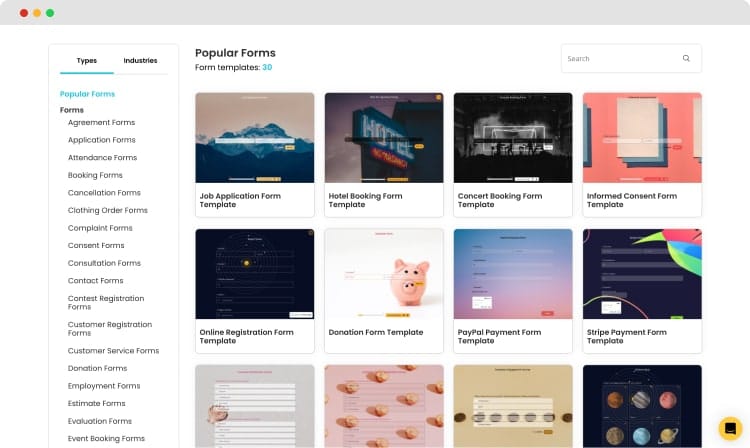
Choose a template to start
2. Customize different features such as your logo, brand colors, and contact information. Depending on your needs, include different types of questions and use logic and branching to show relevant follow-up questions based on previous responses for more targeted insights.
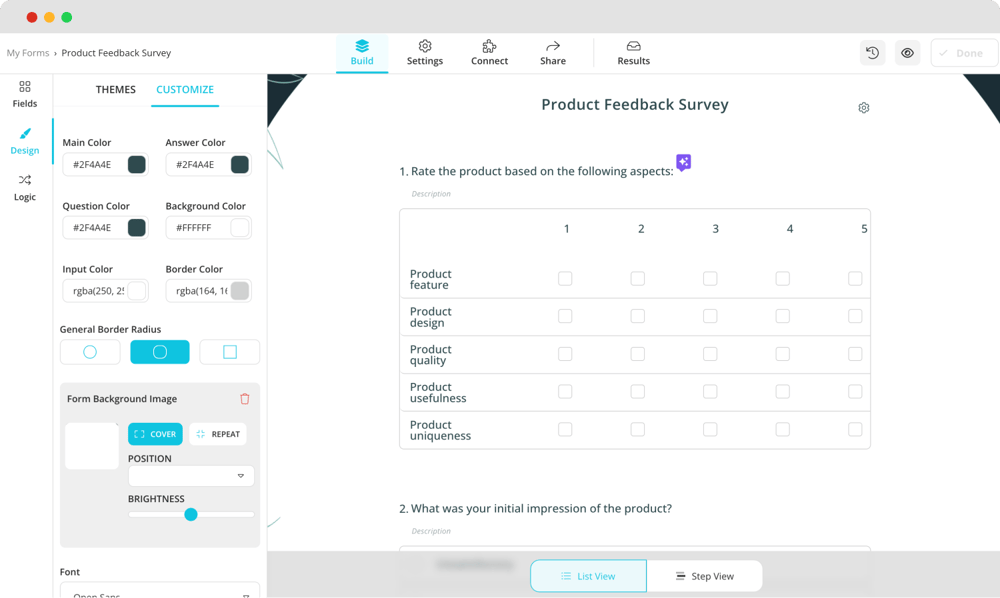
Edit the details
3. forms.app also integrates with your existing tech stack, so once your form is ready, share it via email through your CRM tool and record your responses using Google Sheets for easier analysis:
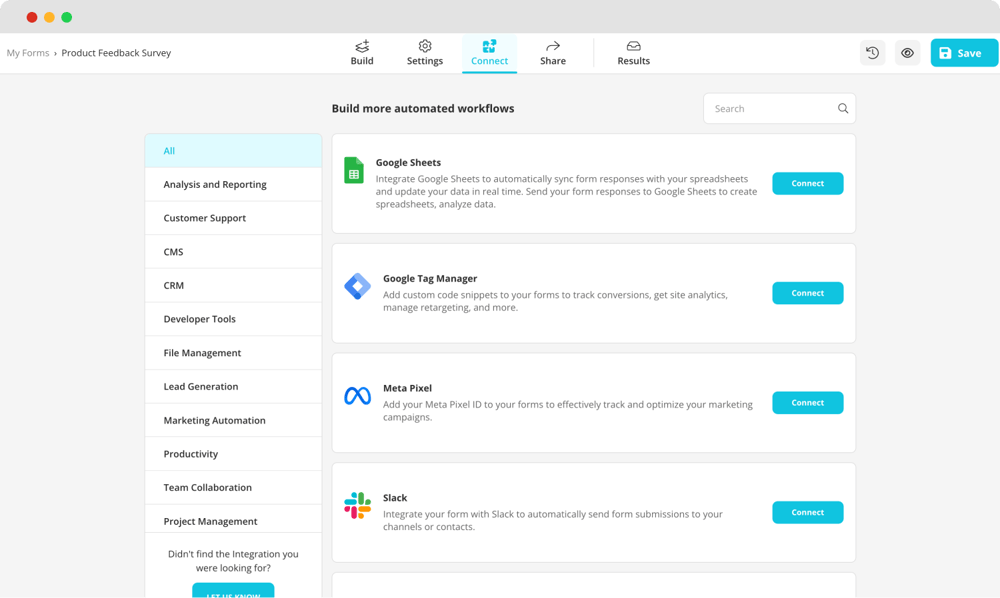
Integrate your survey with other platforms
To improve your response rates, automate your survey with reminders and follow-ups.
Final words
For companies that want to build strong, customer-centric brands, brand surveys will help them gather feedback and gain unbiased insights into essential metrics like brand awareness and customer loyalty.
They’ll also allow you to objectively benchmark performance, identify opportunities to enhance brand equity and find ways to better resonate with your target audience.
Start scaling your surveys today by signing up for a free forms.app account to use our templates to create different brand surveys.
forms.app, your free form builder
- Unlimited views
- Unlimited questions
- Unlimited notifications
